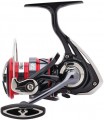Gear ratio
The gear ratio describes the difference in the speed of rotation of the spool and the handle. In reel specifications, it is often written as a ratio of the form x:1, where one indicates 1 turn of the handle, and “x” is the number of turns of the spool in one such turn. To simplify the record, only the first number is indicated in our catalog — for example, the designation 5.2 corresponds to a gear ratio of 5.2: 1.
First of all, the ratio between the speed and the "torque" of the coil depends on this parameter. So, high gear ratios allow you to quickly pull the line, which is important for high-speed wiring — but the power of such reels will be low, and significant efforts on the handle will be required to pull large prey. Conversely, at low numbers, the speed of the line will be small, but you will not have to make significant efforts to move it. In models of the inertialess type (see above), gear ratios of the order of 6 – 7 denote the so-called "high-speed" coils, 4 – 4.5 – "power", and intermediate values \u200b\u200bare universal. Due to their specificity, multiplier models usually have low gear ratios, and the high power of fly fishing reels is due to the fact that the angler rotates the drum directly in them, and the gear ratio is 1.
Spool capacity
The amount of line that can fit on the main spool of a reel with normal winding. It is indicated as a ratio of two numbers, the first of which corresponds to the length of the reeled line in metres, and the second to the thickness in millimetres: for example, the numbers 200 / 0.45 indicate that up to 200 m of fishing line with a thickness of 0.45 mm can fit on the reel.
For different types of fishing, there are recommendations on the optimal value of this parameter; they can be found in special sources. Here we note that the capacity of the spool is indicated exclusively for a smooth fishing line; when using a braided cord, the actual performance may differ markedly.
Winding the line per turn
This parameter determines how much line is wound/unwound in one full turn of the handle. The greater the value of the line winding per revolution, the less force must be applied when pulling the catch, at the same time, the winding speed also increases. An average ordinary reel winds around 50 cm of fishing line in one turn of the handle.
Pulling force
Pulling force determines the maximum weight that the reel can regularly pull on itself, without negative consequences in the future. So, the pulling force of the average coil is at the level of 2-3 kg. Such a model can be entrusted with pulling ashore, with the help of one reel, most of the freshwater fish, from crucian and carp to bream, perch and carp. If you plan to catch catfish, pike or sea fish, then it is better to use a reel with high traction.
Also note that experienced fishermen usually pull the catch ashore not at the expense of the reel, but with the rod itself, using the “fighting” technique. Working with a rod allows you to almost significantly unload the reel.
Instant anti-reverse
Instant stop of the reverse motion of the coil when unwinding. It is very important in jig fishing with stepped wiring, when you need to quickly make 2 – 3 turns and an instant stop. The function is no less in demand in feeder and carp fishing, when you need to slightly tighten the fishing line in order to put a little tension on it for a good fixation of the moment of bite, but at the same time not to move the bait from the bottom. And also an instant stop will not be superfluous when fishing on the current.
Weight
The total weight of the reel (only the device itself, without fishing line). This parameter is important, first of all, for those who select equipment of
the ultralight class — in such gear, the struggle is, as they say, for every extra gram. In other cases, you can not pay special attention to weight.

